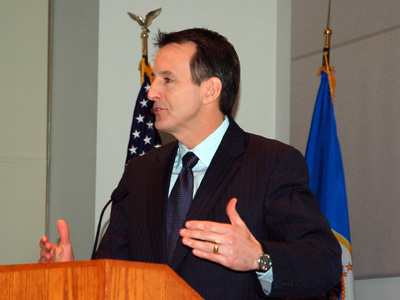
The governor has unveiled his budget proposals to close the large state deficit. A couple of things stand out.
The governor is using money from the Health Care Access Fund, again. This is the tax on health care providers that funds the MinnesotaCare system. It usually runs a surplus. Doctors and providers hate the tax as it is, but they really hate it when the governor takes the money and uses it for things it wasn’t intended to be used for.
The governor is reducing eligibility for Medical Assistance to 100% of the federal poverty level. Right now, that’s $10,400 for a single person. $21,200 for a family of four.
He’s providing less state reimbursement to hospitals and long-term care providers.
Adults without children will no longer be covered under MinnesotaCare. Who are these people? As has been mentioned elsewhere, they’re quite often people with mental illnesses who need meds.
The repeals on MinnesotaCare are most interesting (at least to me). Said the governor:
Several enhancements to health care programs have been enacted in the last three years and are simply unaffordable in today’s financial climate. The Governor’s package repeals recent coverage expansions and premium reductions, some of which have yet to be implemented, in Medical Assistance (MA) and MinnesotaCare.
As indicated before, MinnesotaCare is funded by the Health Care Access Fund (the tax on providers). In recent years, however, the fund’s surplus has been used to offset other areas.
The governor proposes merging the Health Care Access Fund with the General Fund. This is why so much budgeting is now being done through Constitutional Amendments. Taxes are raised for a specific purpose, and eventually, the money gets siphoned off for something entirely different, recreating the original need for the tax.
The governor replaces the 87 counties handling human services program with 15 regional entities.
The governor eliminates state funding of the Combative Sports Commission, and Target Center.
He cuts funding to the Arts Board by almost $3.5 million in FY2010 and almost twice that next year. This will be an interesting debate. Arts groups are included in the constitutional amendment voters approved last November that raised the sales tax to provide additional funding for outdoors and cultural programs. That funding was not originally meant to replace current state support.
He calls for an additional $90,000 in fees via the Barber/Cosmetology Examiners Board. (I nailed that one! See post earlier today). He also increases fees for dairy and food-handling inspections. Currently, it costs a farmer $45 for an inspection. Now, it will cost $100.
He doubles the fee for people who dispense hearing aids from $350 to $700 a year. Also included is a two-year $550 surcharge and a $1,000 exam fee (from $500).
He increases fees for hospitals and ambulatory care facilities to participate in the mandated program to report to the state whenever one of 28 serious health incidents occur. He proposes a $100 increase plus a $3 increase per bed.
He calls for a $45 increase in the fee to inspect swimming pools, citing the new law on drain covers at swimming pools.
He requires local governments to begin paying Well Program fees, including a fee of $50 for each annual monitoring well maintenance permit.
He proposes a 20% fee increase for beverage, food, and lodging licenses.
He does not reduce or delay payments to ethanol producers, something that state did during the last budget crisis.
He eliminates funding for restorative justice programs in the state. Here’s an old MPR story on one such effort.
He proposes a 5% reduction in the governor’s office budget and 5% in the Legislature’s operating budget, and 5% for the Supreme Court, and Secretary of State, and several other agencies and offices.
He doubles fees for trailer parks and recreational camping areas.
He proposes a new $70 fee for background checks for adoptions.
He proposes delaying services to children with severe mental health issues for a year.
There are about a half-dozen MPR reporters working on the story. You can examine some of the budget documents here.

